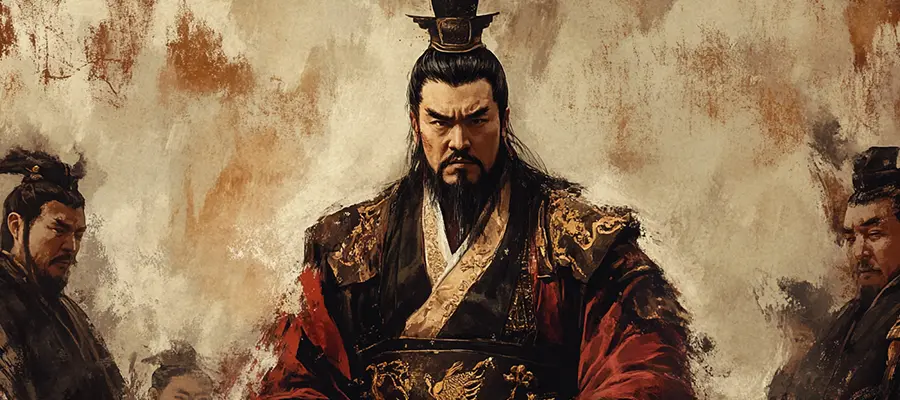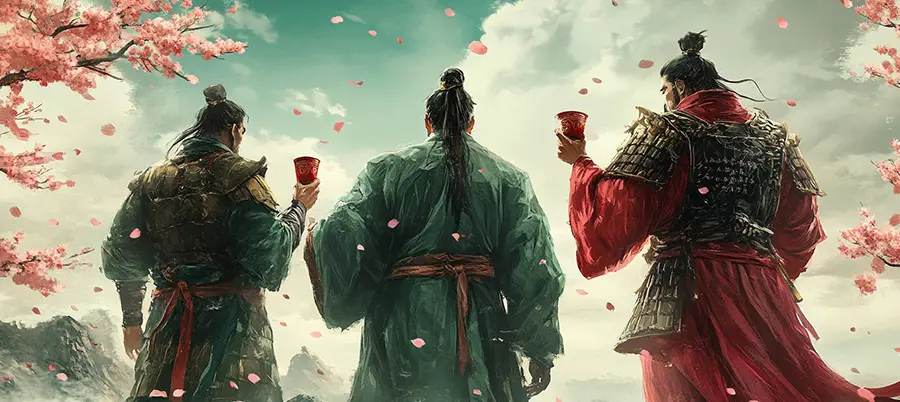Chapter 1: In the Peach Garden, Three Heroes Pledge Eternal Brotherhood
4 minutes read

The domains of the world have long followed a cycle: after a period of division, unity arises, and after unity, division follows. This has been true since antiquity. As the Zhou Dynasty weakened, seven kingdoms arose, each vying for power until Qin emerged victorious. After Qin’s downfall, the kingdoms of Chu and Han fought, and Han ultimately triumphed.
The Han Dynasty began with Liu Bang, who rose from humble beginnings and seized the empire, but internal rebellion caused disruptions. Despite this, Liu Xiu restored the dynasty. The Han Empire continued for another two centuries until the reign of Emperor Xian, when it fractured into three parts, marking the start of the Three Kingdoms period.
The decline of the Han accelerated during the reigns of Emperors Huan and Ling. Emperor Huan relied on eunuchs, and by the time Emperor Ling ascended, corruption had spread. Despite efforts to oust the eunuchs, their power only grew. On one fateful day in AD 168, a black serpent appeared in the Emperor’s hall, followed by disastrous omens such as storms and earthquakes. These signs were interpreted as Heaven’s displeasure.
Court official Cai Yong blamed the eunuchs for the chaos, but his criticisms led to his exile. The eunuchs formed a powerful clique, known as the Ten Regular Attendants, with Zhang Rang gaining significant influence. As their corruption deepened, rebellion brewed across the empire.
In Julu County, Zhang Jue, a medicine man, encountered a mystical figure who gave him a book of divine knowledge. Zhang Jue became renowned for his powers, claiming to bring peace by ending the reign of the “blue heaven” and ushering in a new cycle of fortune. His followers grew, and soon, Zhang Jue envisioned himself as the ruler of a new empire. His rebellion, the Yellow Turban Uprising, spread rapidly, rallying the oppressed with yellow scarves.

Fearing the rebellion, the imperial forces mobilized. In Youzhou, Liu Yan, the local governor, prepared for battle. He enlisted volunteers, including Liu Bei, a descendant of the Imperial family, who had fallen into poverty. Liu Bei, tall and distinguished, had long hoped for a chance to serve his country. One day, he encountered Zhang Fei, a bold and charismatic man who proposed they raise an army against the rebels. Soon after, Guan Yu, a fierce and honorable warrior, joined them, and the three swore an oath of brotherhood beneath a peach tree.
Together, they gathered support, and their ranks swelled to five hundred. With the help of horse dealers, they acquired steeds and weapons, forging a path to restore order and peace. Thus, the three brothers—Liu Bei, Guan Yu, and Zhang Fei—began their campaign to save the empire.
The rebellion broke out when Yellow Scarves chieftain Cheng Yuanzhi led fifty thousand rebels into the region. Liu Yan ordered Zhou Jing and the three brothers to confront them with five hundred troops. Liu Bei, eager for action, led the charge to the Daxing Hills, where they encountered the rebels wearing yellow scarves.
As the armies faced off, Liu Bei rode forward with Guan Yu on his left and Zhang Fei on his right, taunting the rebels. Cheng Yuanzhi, enraged, sent out his general, Deng Mao, who was swiftly killed by Zhang Fei. Cheng Yuanzhi charged at Zhang Fei, but Guan Yu’s green-dragon saber struck him down.
With their leader dead, the rebels fled. Many surrendered, and the rebellion in that region was crushed. Liu Yan rewarded the victors, but the next day, news came that Qingzhou was under siege by rebels and needed immediate aid.
Liu Bei quickly set out with five thousand soldiers. The rebels launched a fierce attack, but Liu Bei devised a strategy. They set an ambush, with Guan Yu and Zhang Fei positioned to strike from the flanks. When the rebels advanced, Liu Bei feigned retreat, drawing them over the hills. At the signal, Guan Yu and Zhang Fei ambushed the rebels from both sides, and they were soon defeated. Qingzhou was saved.
Afterward, Zhou Jing proposed returning to Youzhou, but Liu Bei chose to aid his former teacher, Lu Zhi, who was battling Zhang Jue’s rebels at Guangzong. Liu Bei and his brothers arrived to find the conflict at a stalemate. Lu Zhi tasked Liu Bei with a mission to scout the situation in Yingchuan, where Zhang Jue’s forces were entrenched.
Upon reaching Yingchuan, Liu Bei found the rebels in a vulnerable position and joined Imperial Commanders Huangfu Song and Zhu Jun in attacking them with fire. The rebels, panicked, fled in all directions. But Zhang Ba and Zhang Lian escaped.
While Liu Bei and his brothers returned to report to Lu Zhi, they encountered a group escorting Lu Zhi as a prisoner. He explained that Zhang Jue had used supernatural powers to thwart his victory, and that he had been wrongfully accused by Eunuch Zhuo Feng. Liu Bei restrained Zhang Fei, who wanted to attack the escort, and they parted ways.
As they returned, they encountered a new battle with Zhang Jue’s forces. The three brothers charged into the fray, driving the rebels back and rescuing the Imperial soldiers. But when they met Dong Zhuo, he treated them rudely despite their efforts. Zhang Fei, angered by the disrespect, nearly attacked Dong Zhuo, but Liu Bei intervened.
Love my work? Buy me a coffee! Your support means the world. ❤️